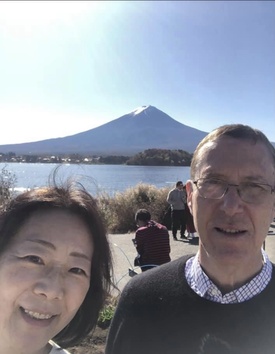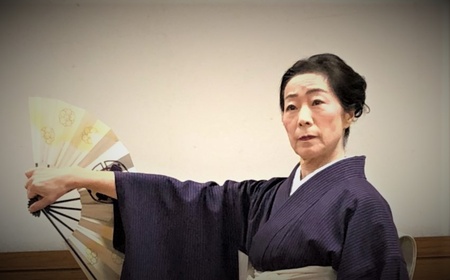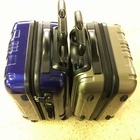Japan for the first time in 32 years
Born This Way is an Emmy Award-winning reality TV show that depicts the real-life lives of young people with Down Syndrome. Hiromi Ashmore, whose eldest daughter was one of the main cast members and who also appeared in the show, returned to Japan in 2019 from Los Angeles where she had lived for 17 years. However, she is not making Japan her final home and is planning to move to Australia with her husband, Steven, in 2022. In this series, we have covered various patterns such as "people who decided to live in the United States permanently," "people who left the United States where they had lived for many years and returned to Japan," and "people who returned to Japan once but returned to the United States again." This time, we would like to introduce the case of Hiromi, who decided to live permanently not in Japan or the United States, but in another country.
Hiromi moved to the US in 2002 when her Australian husband, Stephen, was transferred there. Prior to that, she had accompanied her husband on a job transfer to Los Angeles for several years from 1988, after which they moved to the UK and Australia. Their eldest daughter, Elena, was born in Japan, and their eldest son, Kenneth, was born in the US.
What did Hiromi think of America, where she lived for a total of more than 20 years?
"The good things about America are that it is easygoing and has a wide range of programs for people with disabilities. Also, there is a culture where even if your child is someone else's, they are looked after as a member of society. Also, if you speak up when you are dissatisfied, they will respond appropriately. On the other hand, the bad things are that there is a lot of crime, medical costs are high, and people drive recklessly. If you come directly from Japan, you might think that the houses and spaces are large, but since we were living in Australia, it didn't feel that big (America)."
In 2016, three years before Hiromi returned to Japan in 2019, Steven moved to Japan alone for work. Their eldest son, Kenneth, also got a job in Japan and lived in Fukuoka. Elena lived in a group home near Los Angeles, while Hiromi lived in a house she purchased with Steven in Los Angeles. Then, three years later, when Steven fell ill, Hiromi moved out of their home and returned to Japan. At this time, Elena remained in the group home at her own request.
So, after living outside of Japan for 32 years, did Hiromi find it an easy place to live when she returned to Japan?
"The good things about Japan are that it's safe, the police officers and other public service workers are all kind, and the quality of goods is excellent. Medical costs are much cheaper than in the United States. As for programs for people with disabilities, I think they are more detailed and fairly comprehensive when it comes to adults than in the United States, but I think the quality of programs for children with disabilities is very low. Also, one thing I don't think is so good is that Japan doesn't have a multi-ethnic culture like Los Angeles, so people are kind to their acquaintances (insiders) but cold to strangers (outsiders)."
In Japan, Hiromi used to visit her mother every day before COVID-19, who had moved to a nursing home after it became difficult for her to live at home. She says that her reason for returning to Japan after 32 years was not just because of her husband, but also because of her mother.
Comparing Japan, the US and Australia...
By the way, when Hiromi returned to Japan, Elena stayed behind in Los Angeles, so when I asked if Steven had the option of retiring and living in the US, Hiromi replied, "It would be difficult to stay in California. Medical expenses and property taxes are high if you want to live in the US after retirement."
So what about Japan? "The option of Japan was not realistic for my (foreign) husband. Also, I had been teaching Japanese dance in the United States for a long time, so I wanted to teach in Japan when I returned. However, there are many teachers in Japan, and although I am on the older side, I started teaching late so I have not yet established a foothold, so it was not realistic for me to think about teaching in Japan.
Ultimately, the couple decided to emigrate to Stephen's home country of Australia.
"In Australia, I think I would have the chance to teach Japanese dance, just as I did in America. I would like to move there as soon as possible while I am still active and start working in the local community. But above all, Elena is the most important thing to me. In Australia, I should be able to live the same kind of life I have now in America. Also, Australia has national health insurance, and Australians are friendly and nice people. Possible locations are the Gold Coast or the suburbs of Brisbane. I know that there are taiko drumming groups in both the Gold Coast and Brisbane, which are my hobby."
Steve, who has already retired, will arrive in early 2022 and start house hunting.
"I think it's fine for the house to be wherever my husband chooses. The next thing I'll do is get Elena to come over. She's happy with her current life in a group home (in Los Angeles), and she's not really willing to listen to my wishes. So my plan is to tell her to go visit Australia and come and pick me up with a one-way ticket. Then I'll have her participate in a program for people with disabilities, line up some nice Aussie boys and do my best to change her mind (laughs)."
As a friend, I hope that the Ashmore family will live happily in Australia. I'm sure Hiromi will enjoy life there by teaching Japanese dance and playing the taiko drums. I can see that image clearly in my mind.
© 2021 Keiko Fukuda








